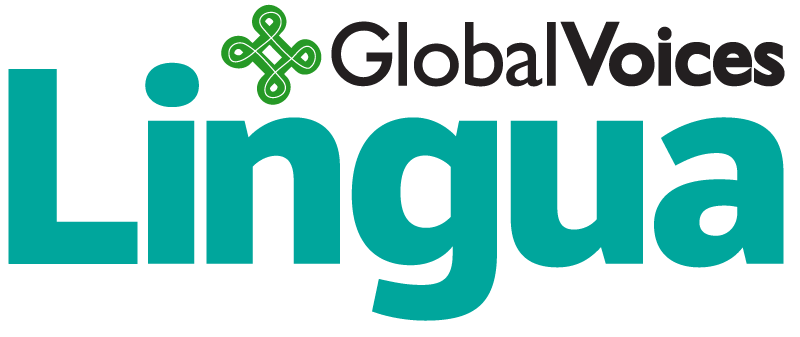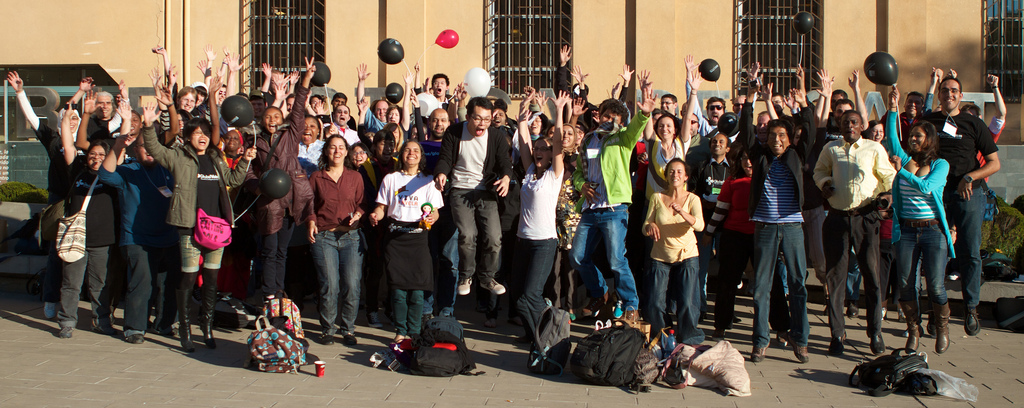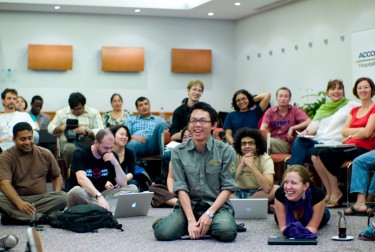The Lingua community amplifies Global Voices stories by translating them into dozens of languages. We do this with the help of hundreds of volunteers from around the world.
Have questions about the Lingua community? Read more below.

Global Voices Lingua participants at our summit in Colombo, Sri Lanka. Photo by Jer Clarke.
Use this application form to contact us and get involved. Have questions? Check out our Lingua Volunteer FAQ below.
A little background
Inspired by a workshop on language at the 2006 Global Voices Summit in Delhi, India, a group of francophone bloggers had an idea. They approached founders Ethan Zuckerman, Rebecca MacKinnon, and a Taiwanese contributor Portnoy Zheng about starting a Global Voices site in French, similar to the site in Chinese that Portnoy pioneered earlier. Other language communities expressed interest in translating Global Voices stories, and this is how Lingua was born.
Being a Lingua translator
Lingua translators have diverse backgrounds. They include professional translators, students, journalists, and language enthusiasts.
Lingua translators are credited on every article they translate. Many volunteers come to Lingua to build translation experience and expand their translator portfolios. What unites the Lingua community is the passion for languages and an interest in making Global Voices stories available to a global audience.
Each language in the Lingua community has one or more Translation Managers who run the site, support and train translators, and review translations before they become published.
You can also propose a Lingua site in a new language!
Follow us on Facebook and Twitter, and don't forget to subscribe to our newsletter!
Frequently Asked Questions
Is your question not there? Please contact us!
Contents
- 1 What is Global Voices and what is Lingua?
- 2 Why should I become a volunteer translator?
- 3 I would like to become a volunteer translator, what should I do?
- 4 I am not a professional translator. Can I still apply to volunteer?
- 5 What happens after I apply to become a volunteer translator?
- 6 Can I choose the posts I want to translate?
- 7 Where can I find help if I have a tech or translation-related question?
- 8 What happens if I make a mistake in my translation?
- 9 Is there a minimum commitment to be a volunteer? What about deadlines?
- 10 Do you offer payment for translations?
- 11 Why translate ourselves, when people can use Google Translate?
- 12 I am a translation student. Do you offer internships?
- 13 So Global Voices collaborators never meet face to face? How do you work remotely?
- 14 Are you only looking for translators from English?
- 15 Are you also looking for volunteers to cover the blogosphere in other languages?
- 16 Are there any other ways to get involved?
- 17 Lingua contact form
What is Global Voices and what is Lingua?
Global Voices is a border-less, mostly volunteer community of hundreds of writers, analysts, online media experts, and translators. Global Voices has been leading the conversation on citizen media reporting since 2005; curating, verifying and translating trending news and stories you might be missing on the Internet, from blogs, independent press, and social media in 167 countries. We are a polyglot community of people who collaborate on a range of projects including Rising Voices, Advox, Community blog and Lingua.
These stories we accurately report on Global Voices are translated into dozens of languages. Major languages, as Chinese, Spanish, and Arabic, as well as minority languages such as Malagasy, Català, and Aymara. Global Voices in these languages, which is the result of the work of hundreds of volunteer translators, is what makes Lingua.
Why should I become a volunteer translator?
Well, see how some of the Global Voices translators answer this question!
“I’m a volunteer translator because I think it’s very important to convey people’s voices in a way and a language each one can understand.”, says Gabriela Garcia Calderon Orbe who joined Global Voices in Spanish in November 2007 and has since translated over 2,680 posts.
“Because I will get to know social media like I have never known it before and also get to meet, through translating Global Voices articles, wonderful people from all over the world, who are as crazy as I am for changes and who are striving for it digitally,” says Thalia Rahme, from Beirut, a volunteer of Global Voices in Arabic and French.
“I like the idea of being able to inform others about what's happening in the remotest, often forgotten locales, thus helping weave ties between people living in the four corners of the world”, says Paris based French translator Samantha Deman.
“Because I learn so much about the world with Global Voices that I want to share this knowledge with those who are not fortunate enough to read it in English,” says Paula Góes, a Brazilian translator based in London who joined Global Voices in Portuguese team in 2007.
“Because it's a truly multicultural experience. Inspiring people write news stories from all around the world – I want to help to make their voice sound loud!” says Kasia Odrozek, a Polish translator based in Berlin who joined Global Voices in Polish team in 2011.
“Because you can help the message reach the people”, says Aygun Janmammadova, a translator from Global Voices in Russian.
“Because I want local voices to be heard globally,” says Maria Waldvogel, who joined the Global Voices in German team in February 2011.
“Volunteering translation for the GV feels like willingly opening new windows to the world and its million realities.”, says Anna Kokkinidou, a translator for Global Voices in Greek.
Besides getting involved in a very rewarding volunteer work, Lingua translators receive top of the page credit for their work and can gain valuable exposure for building translator portfolios. You will be a member of our international community and get to know people from our over the world who share the same interests. Most of all: you will have fun!
I would like to become a volunteer translator, what should I do?
We will be very happy to welcome you to our team! All you need to do to start with is to complete our application form to provide basic information about you. We look forward to receiving your message!
I am not a professional translator. Can I still apply to volunteer?
Yes, you can! No formal translation qualifications or minimum experience are required to apply.
What happens after I apply to become a volunteer translator?
The Lingua Manager or the Translation Manager for the target language you chose will contact you shortly. Bear with us if we didn't return to you immediately, as our Translation Managers are volunteers as well.
Can I choose the posts I want to translate?
Yes! Translators are free to choose any posts from Global Voices in English, Advox, Rising Voices or the Community blog websites that they would like to translate, so you can even specialize in a subject or country of your preference. You can also contact your Translation Manager if you prefer suggestions!
You can always ask your Translation Manager, a colleague on our mailing list or the Lingua Manager. If you have a technical question about how to use our content management system, based on WordPress, you can check our Translators Guide. Take the opportunity to have a look at other Lingua guides.
What happens if I make a mistake in my translation?
Don't worry! Translations are revised by editors before publishing.
Is there a minimum commitment to be a volunteer? What about deadlines?
You are required to translate at least once a month. Deadlines are negotiable depending on the time-sensitivity of the post, the more time-sensitive the better. In all cases communicate with your Translation Manager and let them know if you can't do something on time.
Do you offer payment for translations?
Unfortunately, no. Global Voices is a volunteer-powered project, and the Lingua sites are possible thanks to the generosity of hundreds of volunteers, who donate their spare time to translate and through this work make bridges between languages and cultures. Having said that, our translators feel very rewarded in so many other ways, and most have a kind of satisfaction that no financial rewards ever give: they feel they are making a positive contribution to the world. Translators learn a lot from their work too, and many volunteers to extend this knowledge to people in their countries.
Why translate ourselves, when people can use Google Translate?
Translation machines give you a sense of what a web page is. However, it is not the recommendable tool for those who want to deepen their understanding of the world, learn about the beauty of other cultures and would like to understand the nuances of a different language, not to mention that these translation tools are not available in some languages, such as Bangla or Aymara. We prefer to offer our readers a translation we did with love!
I am a translation student. Do you offer internships?
Yes! We can give you a place on our team as a translator, proofreader, and other roles! However, please bear in mind that we do not have a physical office, so all work is done remotely, and there might be no opportunity to meet editors face to face. If your internship work can be done remotely, please feel free to let us know what it requires from Global Voices and we will do out best to accommodate your needs. Either way, you can always join Global Voices as a volunteer!
So Global Voices collaborators never meet face to face? How do you work remotely?
Our volunteers are all over the world, and this is one of most the beautiful aspects of the project. We communicate through mailing lists and email. We share content through social network sites, and we hold online calls – every team has its own ways to work together. However, we do meet face to face every time that the opportunity presents itself. There may be local meetups for Global Voices volunteers who live in the same city or special meetups when two or more GVers happen to be at the same place. Likewise, should you travel around the world, it is more than likely that you will stumble upon a GVer wherever you go.
Apart from impromptu meetings, every other year or so, Global Voices hosts its Citizen Media Summit somewhere in the world, and we take the opportunity to try to bring together as many volunteers as possible! See some photos of the time we met, in the Philippines for example!
Are you only looking for translators from English?
We welcome translators who can translate into English, based on the availability of content written in non-English languages. Please apply and we will reply when it is available!
Are you also looking for volunteers to cover the blogosphere in other languages?
We also welcome volunteers who would like to help our editors to cover a language or a region. Do you blog from or about a region or country that is ignored by traditional media? Do you follow the “conversation” on the Internet in your own country or some other country you know well? If you would like to help us improve our coverage, please check our author application page for details about how to contribute articles summarizing the activity of your country's netizens and who to contact. And yes, you can join Global Voices as both, volunteer author and translator.
Are there any other ways to get involved?
Yes, there are plenty of other ways to get involved! Becoming a part of the Global Voices community either as a reader or a contributor can be a very gratifying experience. Here are some ways you can support Global Voices:
- Be part of the extended community: you can follow our Twitter feed or connect with us on Facebook.
- Share our content: when you like a post, please do recommend it to your followers using our share buttons. You can also republish it: our content is available under a Creative Commons license which means you only need to attribute and link back to us.
- Follow and embed our RSS feed on topics or countries that interest you (like “Human Rights” or “the Middle East & North Africa”) directly on your website.
- Write about us: help us to reach our goal to amplify voices by writing about us! Please feel free to spread the word in social networks, and why not: talk about us offline too.
- Invite friends to volunteer: if you know people who would like to join us, point them to this page!



